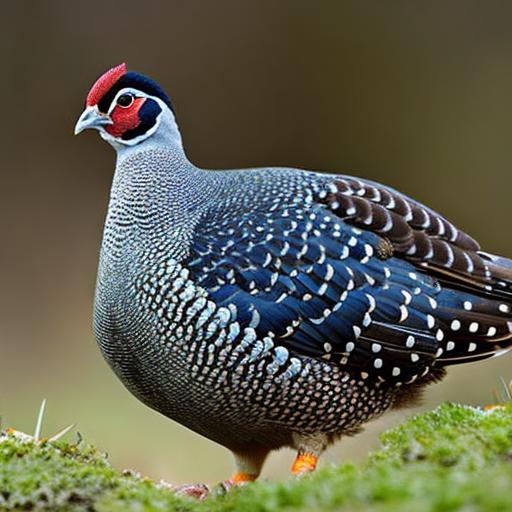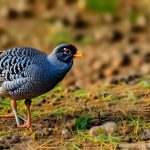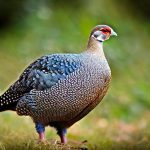Guinea fowl are hardy birds, but they still have specific needs during the winter months. Understanding these needs is crucial for ensuring the health and well-being of your flock. In winter, guinea fowl require adequate shelter to protect them from harsh weather conditions, access to proper nutrition to maintain their health, and protection from predators that may be more active during this time. Additionally, monitoring their health and providing entertainment are important aspects of caring for guinea fowl in winter.
Guinea fowl are native to Africa, where they are accustomed to warmer climates. As a result, they are more sensitive to cold temperatures and require shelter to keep them warm and dry during the winter months. They also need access to fresh water and proper nutrition to maintain their health and energy levels. Additionally, guinea fowl are at risk of predation during the winter, as some predators may be more active in search of food. Monitoring their health is crucial during this time, as they may be more susceptible to illness or injury in the colder weather. Providing entertainment for guinea fowl is also important, as they may become bored or stressed during the winter months.
Key Takeaways
- Guinea fowl need shelter from harsh winter weather to stay healthy and comfortable
- Providing a draft-free and well-ventilated shelter is essential for guinea fowl in winter
- Proper nutrition, including high-quality feed and access to fresh water, is crucial for guinea fowl in winter
- Managing water sources to prevent freezing and providing warm water is important for guinea fowl in winter
- Protecting guinea fowl from predators, such as securing coops and using deterrents, is vital in winter
- Regular health checks and monitoring for signs of illness are important for guinea fowl in winter
- Keeping guinea fowl entertained with toys, treats, and space to roam can help prevent boredom and stress in winter
Providing adequate shelter for guinea fowl in winter
During the winter months, it is essential to provide guinea fowl with adequate shelter to protect them from harsh weather conditions. This shelter should be well-insulated and draft-free to keep the birds warm and dry. A well-ventilated coop or shelter is also important to prevent the buildup of moisture, which can lead to respiratory issues in guinea fowl. Additionally, providing roosting bars or platforms inside the shelter will allow the birds to perch and keep their feet off the cold ground.
In addition to a well-insulated shelter, it is important to provide bedding such as straw or wood shavings to keep the floor of the coop dry and comfortable for the guinea fowl. This bedding should be changed regularly to maintain cleanliness and prevent the buildup of moisture. It is also important to ensure that the shelter is predator-proof, with secure doors and windows to prevent access by predators such as foxes, raccoons, or birds of prey. Providing adequate shelter for guinea fowl in winter is crucial for their health and well-being during the colder months.
Ensuring proper nutrition for guinea fowl in winter
Proper nutrition is essential for maintaining the health and energy levels of guinea fowl during the winter months. In colder weather, guinea fowl require additional calories to maintain their body temperature and energy levels. Providing a balanced diet that includes high-quality poultry feed, grains, and fresh fruits and vegetables is important for meeting their nutritional needs. Additionally, offering access to grit and oyster shell will help support their digestive health and provide essential minerals for egg production.
During the winter months, it is important to monitor the food intake of guinea fowl and adjust their diet as needed to ensure they are receiving enough calories to stay warm and healthy. Supplementing their diet with protein-rich treats such as mealworms or black soldier fly larvae can also help support their energy levels during the colder months. It is important to provide fresh, clean water at all times, as dehydration can lead to health issues in guinea fowl. Ensuring proper nutrition for guinea fowl in winter is crucial for supporting their overall health and well-being during this time.
Managing water sources for guinea fowl in winter
Managing water sources for guinea fowl in winter is crucial for ensuring their health and well-being during the colder months. It is important to provide access to fresh, clean water at all times, as dehydration can lead to health issues in guinea fowl. In colder weather, water sources may freeze, so it is important to regularly check and thaw any frozen water containers to ensure the birds have access to water throughout the day.
One way to manage water sources for guinea fowl in winter is to use heated waterers or water heaters to prevent freezing. These devices can help maintain a constant water temperature and prevent ice from forming in the containers. Additionally, providing multiple water sources throughout the coop or outdoor area will ensure that the guinea fowl always have access to water, even if one source becomes frozen. Managing water sources for guinea fowl in winter is essential for supporting their overall health and well-being during the colder months.
Protecting guinea fowl from predators in winter
Protecting guinea fowl from predators is crucial during the winter months when some predators may be more active in search of food. It is important to secure the coop or shelter with sturdy fencing and predator-proof doors and windows to prevent access by predators such as foxes, raccoons, or birds of prey. Additionally, installing motion-activated lights or alarms can help deter predators from approaching the guinea fowl’s living area.
Another way to protect guinea fowl from predators in winter is to provide them with a safe outdoor area that is enclosed with secure fencing. This will allow them to have access to fresh air and exercise while remaining protected from potential threats. It is also important to regularly inspect the perimeter of the coop or shelter for signs of digging or damage that may indicate predator activity. Protecting guinea fowl from predators in winter is essential for ensuring their safety and well-being during this time.
Monitoring the health of guinea fowl in winter

Monitoring the health of guinea fowl is crucial during the winter months when they may be more susceptible to illness or injury. It is important to regularly observe the birds for any signs of illness or distress, such as lethargy, decreased appetite, or changes in behavior. Additionally, checking their feet for signs of frostbite and inspecting their feathers for lice or mites will help ensure their overall health and well-being.
Another way to monitor the health of guinea fowl in winter is to provide regular veterinary check-ups and vaccinations as needed. A veterinarian can provide guidance on maintaining the health of the flock and offer treatment options if any health issues arise. It is also important to maintain a clean living environment for the guinea fowl by regularly cleaning their coop or shelter and providing fresh bedding. Monitoring the health of guinea fowl in winter is essential for identifying and addressing any potential health concerns before they become serious issues.
Tips for keeping guinea fowl entertained in winter
Keeping guinea fowl entertained during the winter months is important for preventing boredom and stress. Providing enrichment activities such as hanging treats or toys in their living area will help keep them mentally stimulated and engaged. Additionally, allowing them access to a larger outdoor area where they can explore and forage will provide them with opportunities for exercise and mental stimulation.
Another way to keep guinea fowl entertained in winter is to provide them with dust bathing areas where they can engage in natural behaviors such as preening and dust bathing. This will help keep their feathers clean and healthy while providing them with an enjoyable activity. Additionally, providing perches or platforms inside their shelter will allow them to roost and observe their surroundings, which can help prevent boredom and stress. Keeping guinea fowl entertained in winter is essential for supporting their overall well-being and happiness during the colder months.
In conclusion, caring for guinea fowl in winter requires understanding their specific needs and providing adequate shelter, nutrition, water sources, protection from predators, monitoring their health, and keeping them entertained. By addressing these aspects of care, you can ensure the health and well-being of your flock during the colder months.
If you’re looking for tips on keeping guinea fowl in winter, you might also be interested in learning about the Producers Pride Sentinel Chicken Coop. This coop is designed to provide a safe and comfortable environment for poultry during the colder months, ensuring that your guinea fowl stay healthy and happy. Check out the article on Poultry Wizard for more information on how to best care for your feathered friends in winter.
FAQs
What are some important considerations for keeping guinea fowl in winter?
Some important considerations for keeping guinea fowl in winter include providing adequate shelter, ensuring access to fresh water, and providing a balanced diet to help them stay healthy and warm.
How can I provide adequate shelter for guinea fowl in winter?
Adequate shelter for guinea fowl in winter can be provided by ensuring they have a draft-free coop or shelter with good ventilation, dry bedding, and protection from wind, rain, and snow.
What should I consider when it comes to providing fresh water for guinea fowl in winter?
It’s important to ensure that guinea fowl have access to fresh, unfrozen water in winter. This may require using heated waterers or regularly checking and replacing water to prevent it from freezing.
What kind of diet should I provide for guinea fowl in winter?
In winter, it’s important to provide guinea fowl with a balanced diet that includes high-quality poultry feed, grains, and access to forage if possible. Additionally, providing supplemental sources of protein and vitamins may be beneficial during the colder months.
How can I help guinea fowl stay warm in winter?
To help guinea fowl stay warm in winter, providing adequate shelter, dry bedding, and access to a balanced diet is essential. Additionally, ensuring they have access to sunlight and protecting them from harsh weather conditions can also help them stay warm.
Meet Walter, the feathered-friend fanatic of Florida! Nestled in the sunshine state, Walter struts through life with his feathered companions, clucking his way to happiness. With a coop that’s fancier than a five-star hotel, he’s the Don Juan of the chicken world. When he’s not teaching his hens to do the cha-cha, you’ll find him in a heated debate with his prized rooster, Sir Clucks-a-Lot. Walter’s poultry passion is no yolk; he’s the sunny-side-up guy you never knew you needed in your flock of friends!







